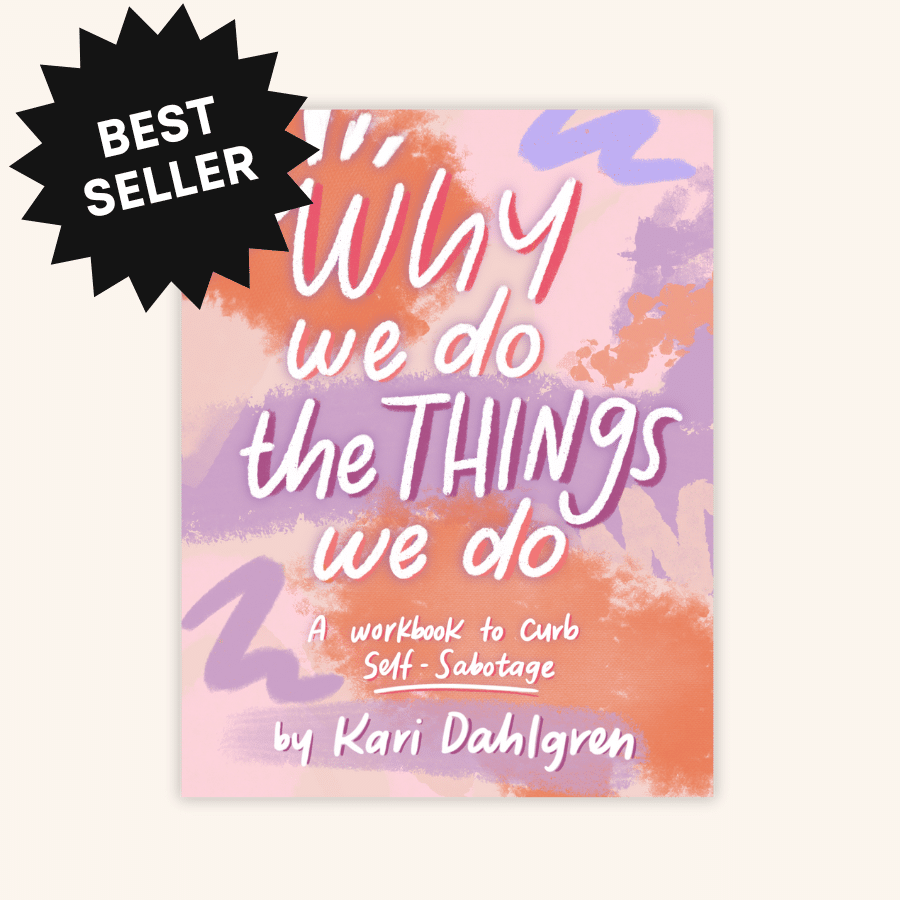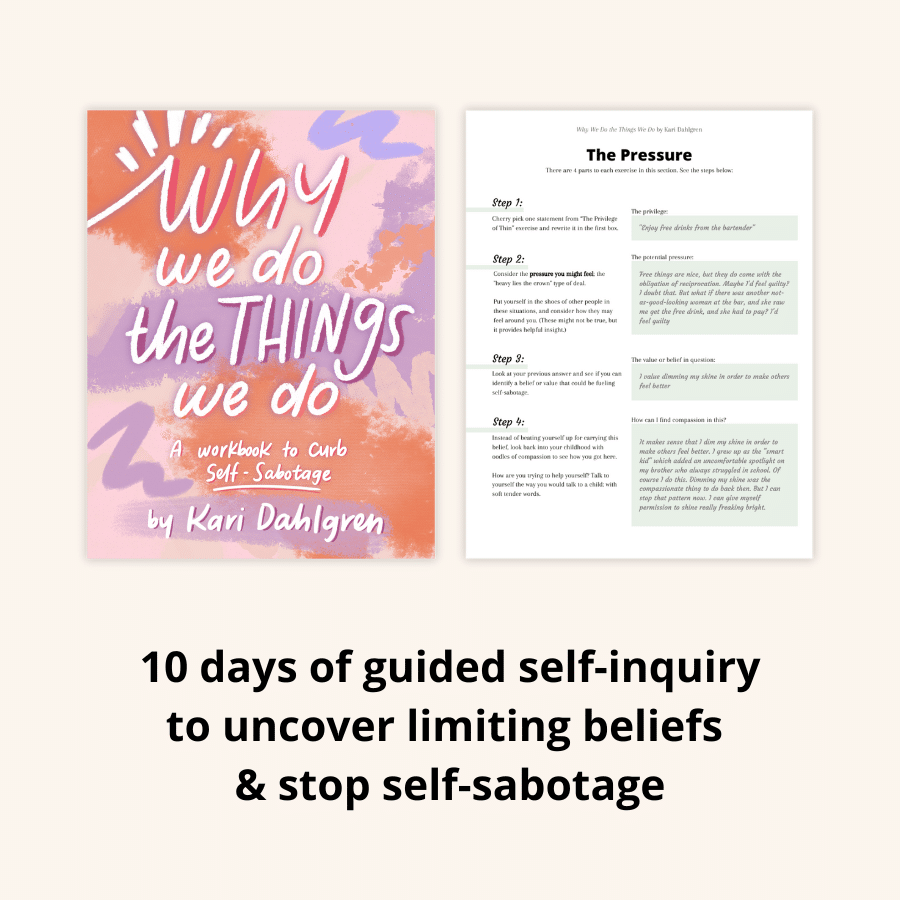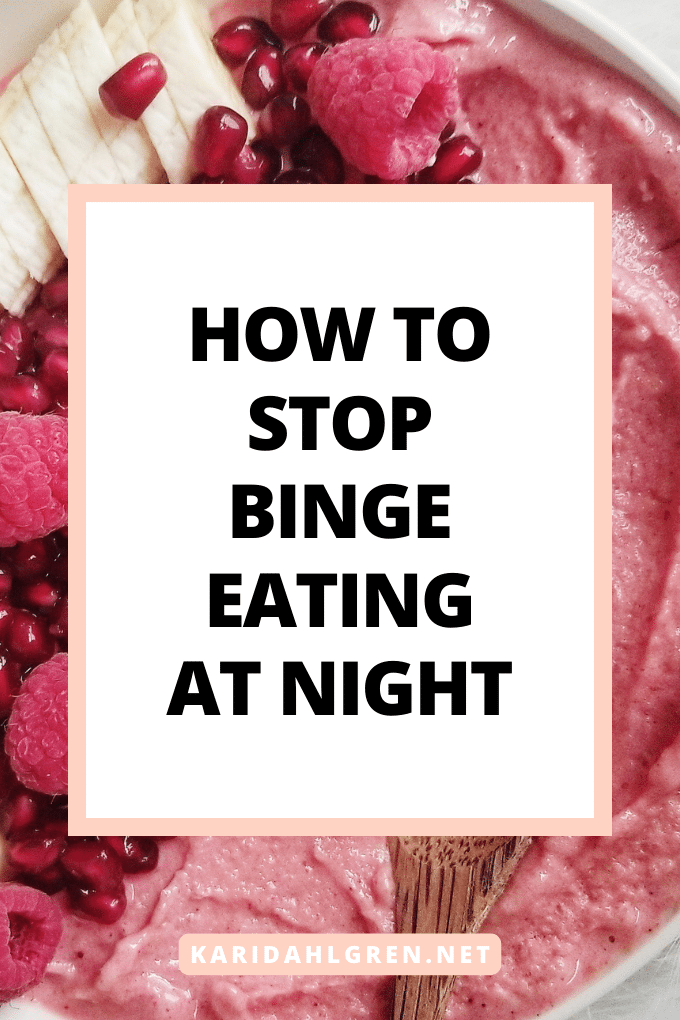
Back when I was still stuck in the grips of yo-yo dieting, I frequently found myself wandering into the kitchen at midnight shoveling snacks into my mouth even though I desperately wanted to stop overeating. Back then, I labeled myself a “night eater,” but I’ve since learned a crucial distinction: there’s a difference between night eating and Night Eating Syndrome.
Many people experience a tendency to snack and graze at night, similar to my own struggles. However, there’s a more severe form of this pattern known as Night Eating Syndrome, a distinct type of eating disorder characterized by consuming over half of one’s daily calories after 6pm.[1], [2]
Because there is a wide spectrum of symptoms amongst night eaters, with some requiring help from an eating disorder specialist, I wanted to paint a really clear picture of what Night Eating Syndrome is and what it isn’t. You’re about to learn the symptoms and causes of Night Eating Syndrome, as per clinical research, along with plenty of tips to address the pattern.
When Does Binge Eating at Night Count as Night Eating Syndrome?
Many of us casually refer to eating food late at night as night eating, which is different from Night Eating Syndrome. Night eating involves more than simply having a snack at 9pm.
Night Eating Syndrome involves eating less food in the morning and consuming more than half of your daily intake after 6pm or more than 25% of your daily intake after dinner (depending on which clinical studies you look at).[1], [2], [3]
Eating proportions aside, over 90% of individuals with Night Eating Syndrome experience episodes of waking up during the night and engaging in compulsive eating.[4] While it is unclear what quantity of food falls under Night Eating Syndrome, the DSM-5 (the authoritative guide for psychiatric diagnoses) explicitly states nocturnal eating behaviors as a definitive symptom.
Here are the most commonly listed symptoms of Night Eating Syndrome according to clinical research:
- Decreased appetite in the morning[4], [5], [2]
- Consuming 50% of your daily intake after 6pm or 25% of your daily intake after dinner[2], [3]
- Getting up to eat in the middle of the night[4], [5], [6]
- Depression, anxiety, and/or stress[7]
- Insomnia[7], [2]
Night Eating Syndrome is considered a type of eating disorder, albeit one that doesn’t fit neatly into the more commonly known categories. It’s classified within Other Specified Feeding or Eating Disorder (OSFED) in the DSM-5 diagnostic criteria.
If you experience several of the symptoms listed above, it’s best to work with a medical professional that specializes in eating disorders.
Eating Disorders vs Disordered Eating: Disordered eating encompasses a range of irregular eating behaviors while an eating disorder is characterized by persistent, harmful eating behaviors that significantly impair physical health or psychosocial functioning.[8]
One of the symptoms of Night Eating Syndrome—consuming 50% of your caloric intake after 6pm—deserves a closer look under the lens of Binge Eating Disorder. If you binge on large amounts of food late at night, where is the line between “normal eating,” Binge Eating Disorder, and Night Eating Syndrome?
Are You a Night Eater, Binge Eater, or Normal Eater?
There are many symptoms outlined in the DSM-5 diagnostic criteria for Binge Eating Disorder, and I’m not going to dig into all of them here. Instead, I want to point out a couple criteria for Binge Eating Disorder that are worth noting for anyone concerned about night eating patterns.
Some—but not all—of the criteria for Binge Eating Disorder includes:
“Eating… an amount of food that is definitely larger than most people would eat in a similar period of time under similar circumstances”
“The binge eating is not associated with the regular use of inappropriate compensatory behavior (e.g., purging, fasting, excessive exercise)…”
Worth noting: dieting counts as a compensatory behavior. If you’re reducing calories to lose weight, it’s normal to eat more at night if it means your body is playing “catch up” for the calories it missed throughout the day.
Instead of looking at your behavior only through the lens of, “I eat a lot at night and therefore I have a problem,” it’s important to look at how much you’re eating throughout the entire day, and how most people would react under similar circumstances.
I strongly encourage you to keep track of what you eat in a day and then ask a compassionate friend or, better yet, a medical professional if you’re eating enough. If you aren’t, then you know why you struggle with night eating: your body is rebelling against your diet.
Why Dieters Tend to Eat More at Night
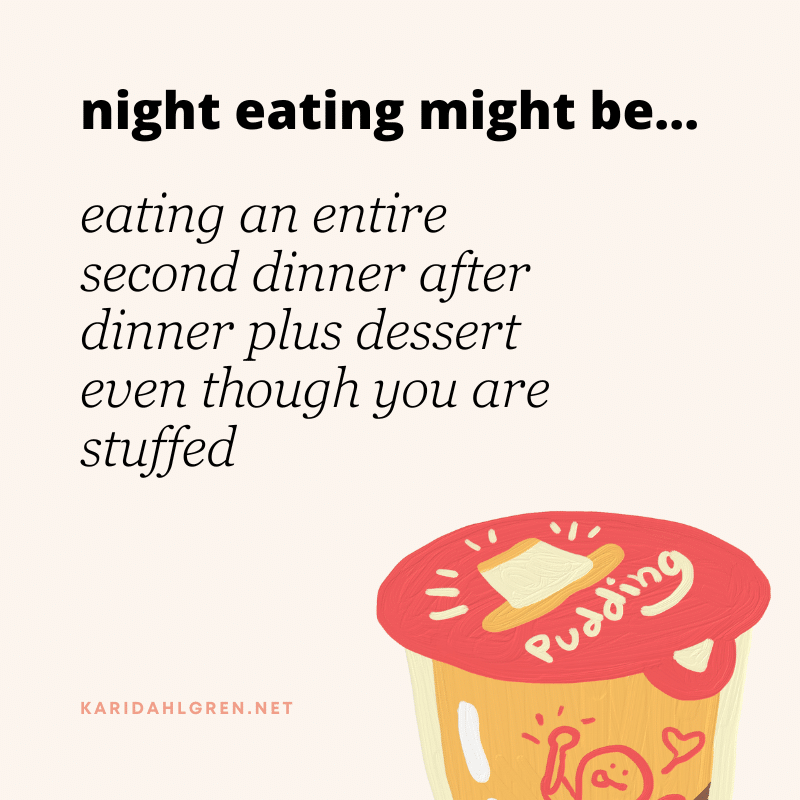
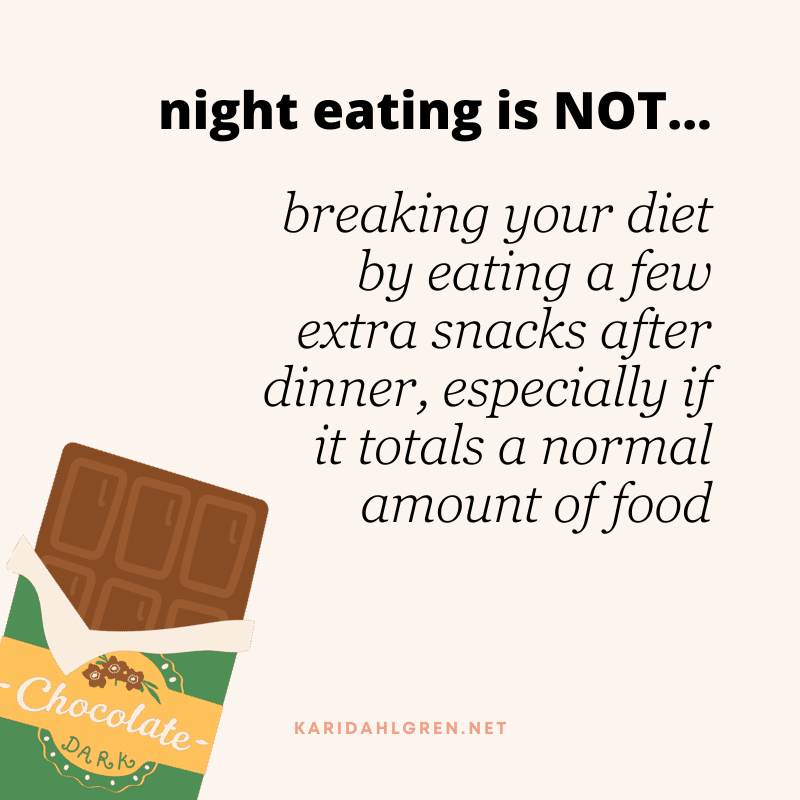
When you pursue weight loss by restricting your food intake (dieting), it actually triggers a series of biological changes like hormone shifts that encourage you to eat.[9] The less you eat, the more your body motivates you to eat by triggering cravings for high-calorie foods.[10]
Your body is wired to protect itself. When you put yourself on a restrictive diet, your body perceives this as famine and slows your metabolism so that you burn less energy.[11], [12] In a frustrating turn of events, this increases the likelihood of gaining weight not losing weight.[13] The vicious cycle continues as dieting also increases cravings so that you eat more—even if it means playing catch-up at night.[14]
All of this happens to encourage weight gain because that’s how your body is wired to survive famine. From an evolutionary perspective, the people that stored fat during times of famine were the people that survived.[15]
If you find yourself eating at night—or even eating in secret late at night due to feelings of shame and embarrassment—it’s important to look at whether or not you’re actually eating enough to sustain your body’s energy needs. Restricting your food intake during the day is a recipe for craving high-calorie foods at night.
To help you gain clarity around whether or not you truly struggle with Night Eating Syndrome, here are some examples of what night eating is not:
- Having a bigger snack than you intended after dinner—but your daily caloric intake is within a normal range (meaning, normal for your current weight, not your ideal weight!)
- Having multiple desserts after dinner—but your daily caloric intake is still within a normal range
- Breaking your diet by eating a bunch of foods after dinner—but you’re not eating more than 50% of your daily intake after 6pm and you’re still eating a normal amount of calories for your body’s needs
If you’re eating less than your body needs (dieting for weight loss), it’s normal to crave high-calorie foods after dinner. You’re wired for it. Your body cannot run on fumes! If you’re undereating during the day and then eating more than you intend at night, maybe it’s not overeating—maybe you’re just eating.
From my experience as an eating psychology coach, most people cannot objectively look at how much they’re eating to determine if it’s actually enough, especially after years of chronic dieting.
To help with this, find a compassionate friend that’s far removed from diet culture and ask them if you’re eating enough. Better yet, ask a medical professional if you’re actually eating enough.
How to Stop Binge Eating at Night: Give Up Dieting Altogether
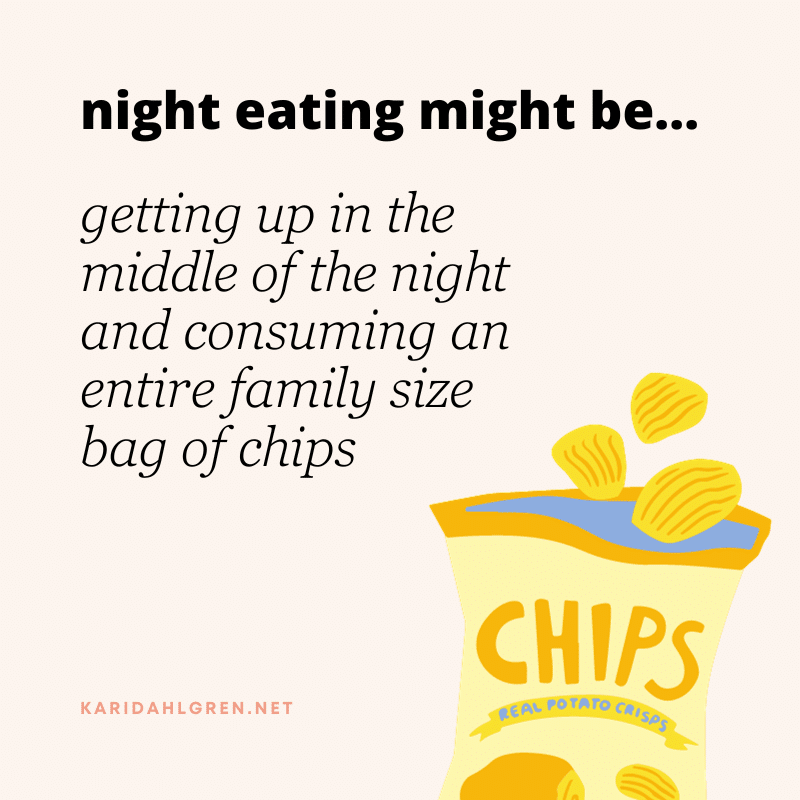
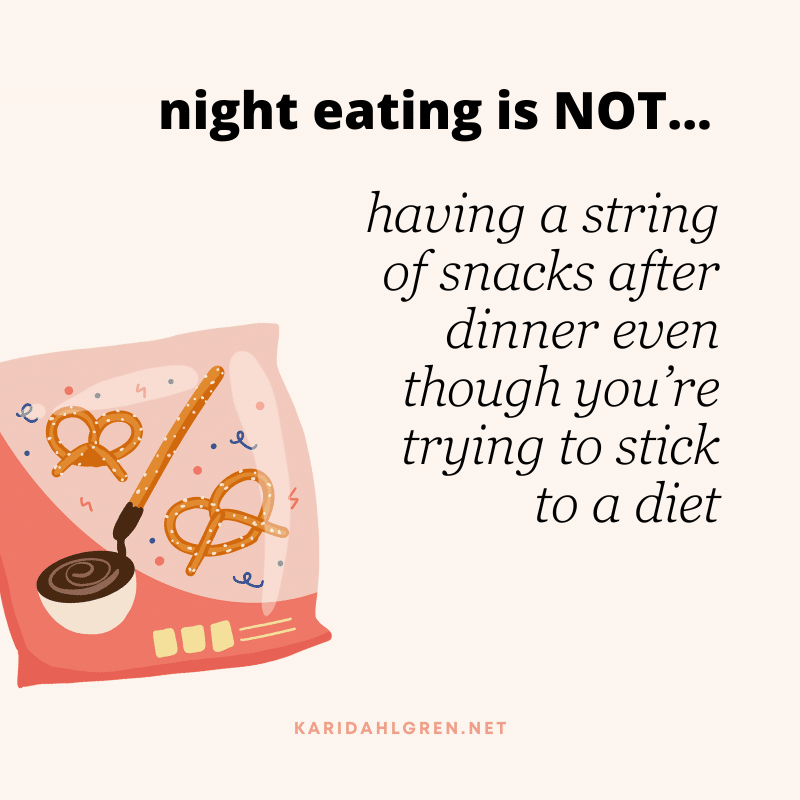
Instead of trying to lose weight through dieting, what would happen if you stopped dieting altogether and focused on eating according to your body’s signals? What if you just ate what appealed to you when you were hungry and stopped when you were full?
First, you’d stop weight cycling (continuously gaining and losing weight), which improves your overall health.[16] Then you’d get back in touch with your body’s natural hunger signals and eventually recover your appetite in the morning.
Once that happens, you may start to eat more evenly distributed meals, reducing the chances of overeating at night. This virtuous cycle (the opposite of a vicious cycle) happens because your body no longer senses a state of famine, leading to reduced cravings for high-calorie foods in the evening—as long as you’re eating enough!
Dieting seldom works long-term and actually increases the likelihood of developing an eating disorder such as Night Eating Syndrome.[17], [18] Intuitive eating, on the other hand, does the opposite: it reduces symptoms of disordered eating while promoting better wellbeing.[19]
Address Night Eating Holistically
Intuitive eating involves eating what appeals to you when you’re hungry and stopping when you’re full. However, it is not a “hunger/fullness” diet. There’s much more that goes into it, like addressing the emotions that drive compulsive eating.
Many of us are skilled at avoiding our emotions. We stay busy and occupied instead of sitting with uncomfortable feelings—like loneliness, stress, or anxiety.
However, staying busy and occupied only works for so long.
When the quiet of night falls and others are asleep, those unresolved emotions can bubble to the surface and trigger compulsive eating at night.
When we continuously outrun discomfort, we create a pattern where we can’t eat intuitively because we can’t stop when we’re full. When we don’t address the emotions that drive compulsive eating, it becomes very hard to stop at fullness because we compulsively need food as a buffer.
To help with this, practice sitting with uncomfortable emotions to develop tolerance for them. Specifically, practice feeling your feelings in the precise moment where you want to eat without hunger. This is the premise behind my Stop, Drop, & Feel technique for stopping compulsive eating.
In the moment where you feel pulled to eat without hunger, there is undoubtedly an edgy emotion that needs your attention. By training in feeling those uncomfortable feelings instead of buffering them with food, you develop tolerance for discomfort—a skill that I call emotional tolerance.
Alternative Methods: How to Stop Binge Eating at Night
Giving up dieting, eating intuitively, eating enough, and feeling your feelings are the major steps for addressing night eating patterns. It is no coincidence that these 4 steps correlate with the 4 pillars of Psycho-Spiritual Wellness: my approach to stopping compulsive eating.
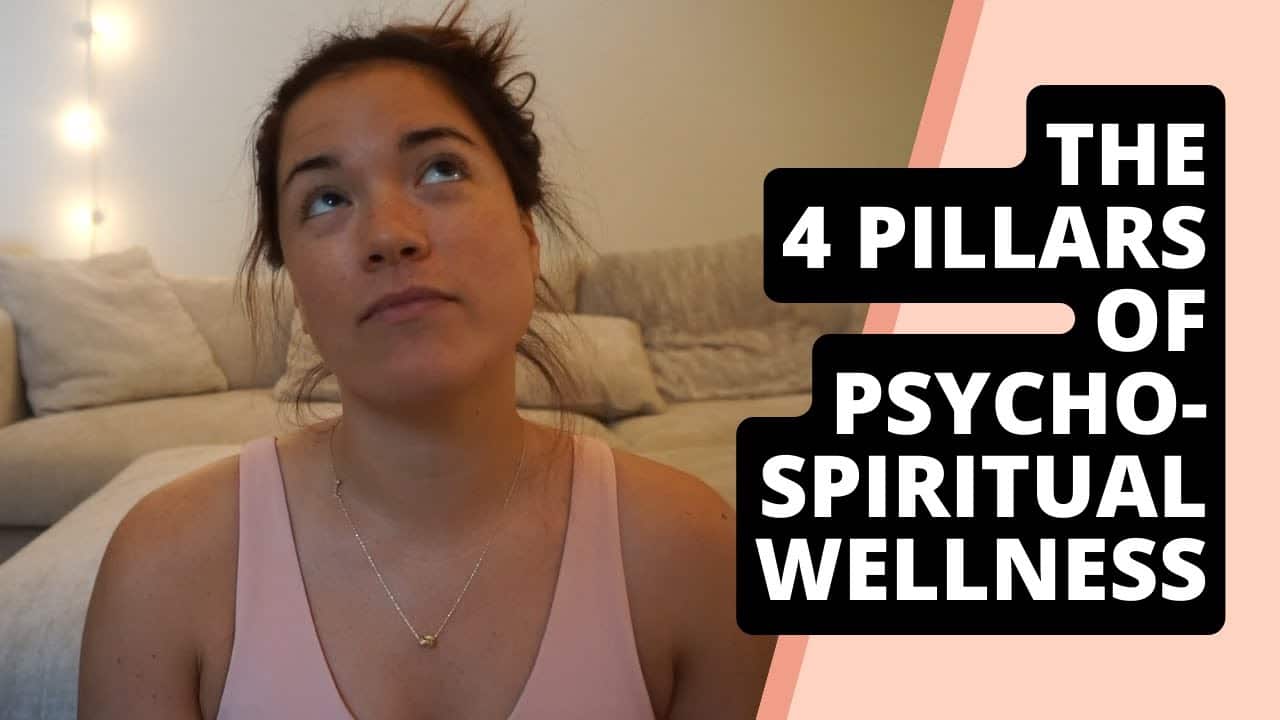
The premise of my approach is focusing on eating psychology instead of dieting, which helps you gain far more traction. While dieting is a skill that leads nowhere because we cannot outrun our biology, eating psychology involves skills that actually lead somewhere productive.
For an even more well-rounded approach, here are some other steps you can take to address night eating patterns:
- Sleep hygiene: Establishing a regular sleep schedule, creating a comfortable sleeping environment, and reducing exposure to screens before bedtime can help since Night Eating Syndrome is linked to insomnia and mood disturbances.[7]
- Abbreviated Progressive Muscle Relaxation Therapy: This is a relaxation technique that involves tensing and relaxing different muscle groups to reduce stress and improve sleep. One noteworthy study found that just 8 days of using APRT for about 20 minutes daily significantly increased morning hunger and reduced nighttime eating tendencies.[2]
- Insomnia treatment: Discuss any sleep disturbances with your doctor, as insomnia is often associated with Night Eating Syndrome.[7] Managing insomnia might involve behavioral strategies, changes in the sleep environment, or medical intervention.
- Cognitive restructuring: This involves recognizing unhelpful thoughts and intentionally replacing them with more helpful thoughts, which has been shown to help with Night Eating Syndrome.[4]
- Move your body: Studies have found that physical activity is a possible solution for Night Eating Syndrome.[4] Intuitive movement, as opposed to a structured exercise regimen, is particularly attractive as it can aid in reconnecting with bodily cues, an important skill for intuitive eating.
- SSRIs: Selective Serotonin Reuptake Inhibitors may help Night Eating Syndrome by increasing brain serotonin levels, which helps regulate mood, sleep, and appetite.[3], [5] Be aware, however, that mood-altering medications can make it more difficult to feel your true emotions, potentially exacerbating emotional eating tendencies.
- Professional help: If you experience any symptoms of Night Eating Syndrome, it’s important to work with a medical professional that specializes in eating disorders to get the help you need.
A Compassionate, Informed Approach to Stop Binge Eating at Night
Night eating as a general habit can often be managed through giving up restrictive dieting and eating enough food throughout the day. That way, biology isn’t trying to motivate you to eat late at night in order to survive (what it perceives as) famine.
On the other hand, Night Eating Syndrome in its clinical form requires professional help because it involves eating over half of your daily calories after 6pm—a behavior indicative of disordered eating or an eating disorder. If you struggle with Night Eating Syndrome or suspect that you might, be sure to reach out to someone. The National Eating Disorders Association has great resources for guidance and support.


